
The Algarve, Portugal
Algarve cuisine draws heavily from its long coastline and Moorish past. Dishes feature abundant fresh seafood and fish, complemented by rich olive oil, aromatic garlic, fresh herbs (especially coriander), and locally grown fruits and vegetables.
Moorish influence is evident in the liberal use of almonds, figs, and carob in many traditional sweets. Tavira, with its strong historical connection to fishing, notably tuna, showcases this heritage in its seafood-centric dishes. Nearby salt pans local distinct ingredients.
Seafood: The star. Expect prawns, clams, octopus, tuna, sardines, various fresh white fish. Meat: Pork and chicken are common. Vegetables: Tomatoes, peppers, onions, potatoes form the base.
Fruits: Oranges, figs, carob, and almonds used in desserts or served fresh. Herbs & Spices: Coriander, parsley, garlic, bay leaf, paprika for deep flavors. Olive Oil: A fundamental ingredient, used generously.
Couvert: Dishes of bread, olives, cheese, or pâté placed on the table are not complimentary. Decline if not wanted. Service Pace: Dining in Portugal takes a relaxed pace.
Arroz de Polvo (Octopus Rice): A comforting rice dish with tender octopus, coriander, and garlic. Find it in most traditional Portuguese restaurants.
Cataplana de Marisco (Seafood Cataplana): A highlight of Algarvian cuisine. Seafood and vegetables cooked in a distinctive copper clam-shaped pot. A shared dish, widely available.
Atum de Cebolada (Tuna with Onions): A tribute to Tavira's tuna past. Pan-fried fresh tuna steaks with a rich, sweet, and savory onion and garlic sauce. Seek this in local eateries.
Sardinhas Assadas (Grilled Sardines): Simple, delicious summer staple. Fresh sardines grilled with salt, served with boiled potatoes and salad. Available in season (summer).
Conquilhas à Bulhão Pato (Clams Bulhão Pato style): Small clams cooked with garlic, olive oil, white wine, and fresh coriander. Delicious with crusty bread.
Street Food: Pão com Chouriço (bread baked with spicy sausage) and Bolas de Berlim (Portuguese doughnuts, often custard-filled, found on beaches).
The world-famous Portuguese custard tart, with a crispy, flaky pastry and a creamy, caramelized custard filling. Available everywhere.
Dom Rodrigos: A specialty of Tavira. Intensely sweet, rich treats from almond and egg yolk threads, wrapped in colorful papers. Figos Cheios / Figos Secos: Dried figs, often stuffed with almonds, carob, or chocolate.
Some hotels offer upscale dining experiences. These often focus on modern interpretations of Portuguese cuisine, with tasting menus or chef’s specials. Look for refined ambiance.
This category presents the most choice. Numerous family-run establishments serve authentic, flavorful Portuguese cuisine in comfortable settings. Located along the riverfront or historic center.
Cafes and snack bars (Pastelarias / Tascas) excel for affordable meals: sandwiches, toasties, soups, and "Prato do Dia" lunch specials.
While Portuguese cuisine dominates, find some restaurants catering to international tastes: Italian (pizza and pasta), Indian, Chinese, and British cuisine.
Especially in areas with more diverse tourist populations.
Cooking Classes and Food Tours: Some local companies or hotels cooking classes, often Algarvian specialties. Guided food tours sample various dishes and learn about the local food scene.
Check with local tourism office or accommodation.
Tavira's salt pans offer tours for salt harvesting.
Wider Algarve and Alentejo regions offer visits.
Seasonal visits possible for cultivation and processing.
Various local festivals throughout the year feature traditional foods and drinks. Check municipal calendar.
Awareness of gluten-free ("sem glúten") and other common allergens is growing.
Highly recommended to carry a "dietary needs card" written in Portuguese for clear communication.
Translation apps (e.g., Google Translate) communicate dietary needs.
Online research: Filter for dietary options. Travel blogs or websites may list friendly restaurants.
Take the ferry to Ilha de Tavira and enjoy fresh seafood at the relaxed beachside restaurants directly on the island.
Several restaurants in Tavira offer scenic views of the Gilão River, the Roman Bridge, or the illuminated castle, a memorable backdrop for your meal.
Some local artisans short workshops where you can learn about traditional crafts like pottery, ceramics, or tile painting.
Look for cooking classes focused on Algarvian cuisine, where you can prepare traditional dishes like cataplana or fresh seafood.
Tavira's salt pans offer unique tours that explain the traditional salt harvesting process.
Wider Algarve and Alentejo regions offer opportunities to visit olive groves or wineries.
Tavira and nearby towns host various local festivals throughout the year, many of which feature traditional foods and drinks. Check the municipal calendar for specific dates.
The Ria Formosa Seafood Festival in Olhão (a nearby town) is a popular summer event, a significant culinary and cultural celebration.
These events present opportunities to taste regional specialties and engage with local food producers.
Many festivals align with harvests or specific seafood seasons, offering the freshest products.
Take the ferry to Ilha de Tavira and enjoy fresh seafood at the relaxed beachside restaurants directly on the island, an unique atmosphere.
Several restaurants in Tavira offer scenic views of the Gilão River, the Roman Bridge, or the illuminated castle, a memorable backdrop for your meal.
The former Tuna Fishing Camp (Arraial Ferreira Neto), now part of the Vila Galé Albacora hotel complex, insight into Tavira's deep-rooted tuna fishing history and communal life.
Seek out unassuming tascas (local eateries) tucked away on side streets in residential areas; these often serve the most authentic and affordable local cuisine.
Do not hesitate to try the "Prato do Dia" (dish of the day) at local tascas. It is often the freshest, most authentic, and best-value meal.
Wander into side streets and residential areas to find hidden culinary gems, often offering more local and less tourist-oriented dining experiences.